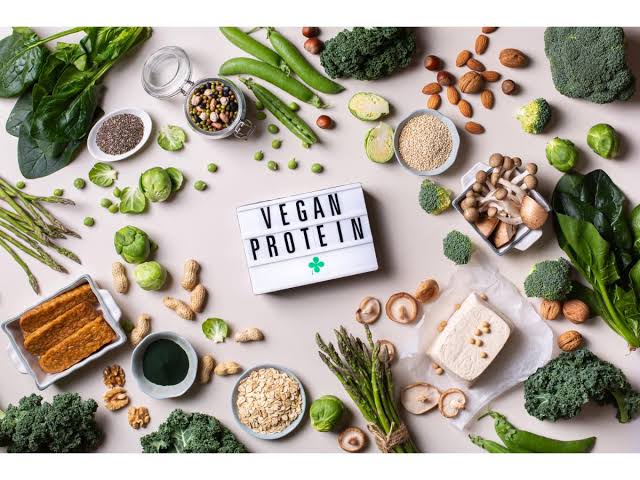Sandeep Dhand Ludhiana
Nutritionist and Health Educator
Vegan food is a plant-based diet that excludes all animal-derived products. This means no meat, fish, eggs, dairy, or any other animal-based ingredients like honey. Instead, vegan diets focus on fruits, vegetables, grains, nuts, seeds, and legumes. Veganism is becoming increasingly popular for health, ethical, and environmental reasons. Let’s explore what vegan food is, its benefits, and how to adopt a balanced vegan diet.

What Is Vegan Food?
Vegan food includes items derived entirely from plants. Unlike vegetarian diets, which may include dairy or eggs, vegan diets avoid all animal-based products. A typical vegan meal plan consists of the following:
- Fruits and Vegetables
These are the foundation of a vegan diet. Common options include apples, bananas, oranges, spinach, carrots, broccoli, and kale. They provide essential vitamins, minerals, and antioxidants. - Legumes and Grains
Lentils, chickpeas, black beans, quinoa, brown rice, and oats are excellent sources of protein and carbohydrates. These are staples in most vegan meals. - Nuts and Seeds
Almonds, walnuts, chia seeds, flaxseeds, and sunflower seeds are rich in healthy fats, fiber, and protein. - Plant-Based Dairy Alternatives
Vegans replace traditional dairy products with alternatives like soy milk, almond milk, oat milk, and coconut milk. Plant-based yogurts and cheeses are also widely available. - Meat Substitutes
Products made from tofu, tempeh, jackfruit, or pea protein are popular meat alternatives. They mimic the taste and texture of meat while being completely plant-based.
Why Do People Choose Vegan Food?
- Health Reasons
Many people choose vegan diets to improve their health. A plant-based diet is naturally low in saturated fats and high in fiber, which helps reduce the risk of heart disease, high blood pressure, and certain types of cancer. - Ethical Concerns
Veganism aligns with the belief in animal welfare. Avoiding animal products prevents the suffering and exploitation of animals in the food industry. - Environmental Impact
The production of animal-based food is a major contributor to greenhouse gas emissions, deforestation, and water usage. By choosing vegan food, individuals can reduce their carbon footprint and support sustainable practices.

Health Benefits of Vegan Food
- Improves Heart Health
Vegan diets are cholesterol-free and rich in nutrients that promote heart health, such as potassium, fiber, and antioxidants. - Supports Weight Management
Plant-based diets are often lower in calories, making it easier to maintain or lose weight. - Reduces Risk of Chronic Diseases
Studies suggest that vegan diets may lower the risk of Type 2 diabetes, certain cancers, and high blood pressure. - Enhances Digestive Health
The high fiber content in vegan foods promotes better digestion and reduces the risk of constipation.
Challenges of Vegan Food
- Nutritional Deficiencies
A vegan diet may lack some nutrients like Vitamin B12, Vitamin D, Iron, and Omega-3 fatty acids. However, these can be obtained through fortified foods or supplements. - Limited Options in Some Areas
In certain places, vegan food options may be less available, making it challenging to maintain the diet. - Social Challenges
Dining out or attending social events can be tricky for vegans, as not all menus or gatherings cater to vegan preferences.
How to Adopt a Vegan Diet?
- Start Slowly
Transitioning to a vegan diet doesn’t have to happen overnight. Begin by incorporating more plant-based meals into your diet and gradually eliminate animal products. - Experiment with New Recipes
Try out vegan recipes to discover delicious plant-based dishes. Popular choices include vegetable stir-fries, lentil soups, and smoothies. - Focus on Nutritional Balance
Ensure your meals contain a variety of nutrients by including fruits, vegetables, grains, proteins, and healthy fats. - Plan Ahead
Meal planning helps ensure you have balanced and satisfying vegan meals ready, reducing the temptation to consume non-vegan foods. - Seek Support
Joining vegan communities or seeking guidance from a nutritionist can make the transition easier.
Vegan Food and Sustainability
- Reduces Greenhouse Gas Emissions
The livestock industry contributes significantly to global warming. A vegan diet can help reduce this impact. - Saves Water Resources
Producing plant-based foods requires much less water compared to animal farming. - Promotes Biodiversity
A shift toward plant-based eating can reduce the need for deforestation, allowing natural habitats to thrive.
Common Myths About Vegan Food
- Vegan Diets Are Always Expensive
While some vegan products like meat substitutes can be pricey, staples like beans, rice, and vegetables are affordable and widely available. - Vegan Food Is Bland
Vegan cuisine is incredibly diverse and flavorful, with dishes inspired by cultures worldwide. Spices, herbs, and sauces can enhance the taste of plant-based meals. - Vegans Don’t Get Enough Protein
Protein is abundant in plant-based sources like lentils, tofu, quinoa, and nuts.
Conclusion
Vegan food is a healthy, ethical, and sustainable choice that offers numerous benefits for individuals and the planet. While it may present some challenges, these can be overcome with proper planning and education. By embracing a vegan lifestyle, you can contribute to better health, animal welfare, and environmental conservation. Whether you’re exploring veganism for personal or global reasons, it’s a journey worth considering.